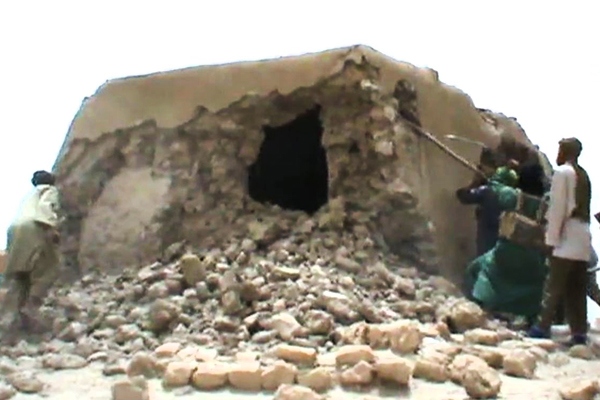SIRTE: Anti-Qaddafi fighters tightened their siege of the ousted leader’s hometown of Sirte on Monday as civilians poured out of the Mediterranean coastal city where doctors spoke of a growing crisis.
Fighters loyal to Libya’s new government also pounded Qaddafi’s forces in the desert city of Bani Walid, southeast of Tripoli, as they sought to take the last two significant remaining bastions of his loyalists.
National Transitional Council troops advancing from the east said they had pushed 10 kilometers (six miles) inside Sirte city limits but were still 15 kilometers (10 miles) from the centre of the sprawling city.
Hundreds of fearful residents fled the looming offensive to retake the city, arriving at NTC checkpoints on the front lines both east and west.
"The situation in the city is very critical," said Muftah Mohammed, a fish trader who was leaving in a convoy of seven vehicles with around 60 relatives and neighbors.
"There is no food, no water, no petrol and no electricity. This has been going on for nearly two months now as Qaddafi forces would not allow us to leave.
"Children are in a particularly bad condition. There is no milk for them. We have all been surviving on just macaroni for several days."
The collapse of the mains supply has left residents without access to clean drinking water, triggering an epidemic of water-borne diseases.
An AFP correspondent saw dozens of children receiving treatment at a clinic in the town of Harawa, 40 kilometers (25 miles) east of Sirte.
"We have medicines but no nurses to treat the constant flow of patients, mainly children, suffering from vomiting and gastrointestinal diseases," said Doctor Valentina Rybakova, a Ukrainian working in Libya for the past eight years.
"Since morning I saw nearly 120 patients and 70 percent of them were children. They are coming from some outskirts of Sirte and nearby villages," she said.
"This is a big humanitarian crisis. We are trying to get help from everybody but the main problem is that these people have no access to clean drinking water."
Another Sirte resident who asked not to be identified was leaving the city with around 20 relatives.
"NATO has been bombing continuously. The children are scared. We had to leave. There was no option," he said.
The alliance said its aircraft had hit a command and control node, three ammunition or vehicle storage facilities, a radar facility, a multiple rocket launcher, a military support vehicle and an artillery piece in Sirte.
There have been repeated reports that one of Qaddafi’s sons — Mutassim — is holed up in Sirte’s southern outskirts.
NTC forces believe that Qaddafi’s most prominent son, Seif Al-Islam, is in the other major enclave still in the hands of loyalist forces, the desert city of Bani Walid.
Troops massed at Bani Walid’s northern gates pounded Qaddafi positions with artillery, tanks and anti-aircraft guns on Monday.
"We are facing heavy resistance, that’s why we are using the heavy artillery and not sending in any infantry for now," Commander Mohamed Al-Seddiq told AFP.
The NTC is keen to put Qaddafi and top members of his former regime on trial for what they say were widespread human rights abuses committed during his 42-year rule.
The gruesome find in a mass grave of the remains of prisoners executed at Tripoli’s notorious Abu Salim jail was yet further proof of "criminal acts" by Qaddafi’s regime, said Khalid Sharif, spokesman for the NTC’s military council.
"We found the place where all these martyrs were buried," Sharif announced in Tripoli on Sunday.
Salim Al-Farjani, a member of the committee set up to identify the remains, appealed for international help.
"We call on foreign organizations and the international community to help us in this task of identifying the remains of more than 1,700 people," he said.
The first demonstrations in Libya which finally ousted Qaddafi last month erupted in Benghazi in February, when families of Abu Salim victims called for protests against the arrest of their lawyer.
Scottish prosecutors meanwhile called on the NTC for help in their continuing investigation into the 1988 bombing of Pan Am flight 103 over the town of Lockerbie in which 270 people died.
The only person convicted of the bombing, Libyan Abdelbaset Ali Mohmet Al-Megrahi, was released on compassionate grounds in 2009.
But the Crown Office, Scotland’s public prosecution service, said there "remains an open enquiry concerning the involvement of others with Mr.
Megrahi."
"We have asked the NTC to make available to the Crown any documentary evidence and witnesses, which could assist in the ongoing enquiries," it added.
Italian oil giant ENI, Libya’s top foreign producer before the seven-month uprising brought output to a near standstill, announced that it had resumed production, pumping 31,900 barrels per day from 15 wells in the Abu Attifel field.
Other wells will be reactivated in the coming days with the goal of creating enough volume to allow production to be transported by pipeline to the Zueitina terminal, the company said.
On Friday, French oil giant Total said it had restarted production from an offshore oil platform off Libya, making it the first major to return to work since the fall of Qaddafi.


